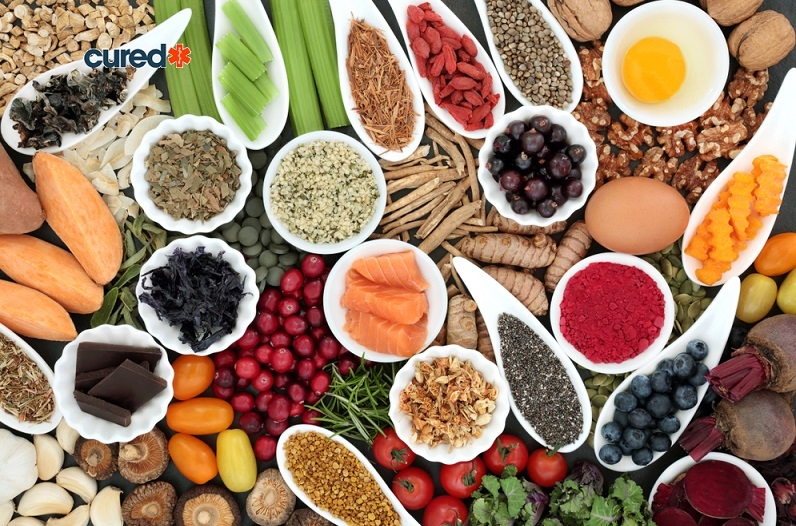The Benefits Of Different Kinds Of Minerals In Food

Introduction
We eat food to absorb the nutrients present in it, which in turn help our body to grow and survive. One category of the nutrients present in food includes minerals. They are essential for the growth of the body and can lead to severe health problems if the intake goes above or below the range prescribed for a certain age and type of body. Read on to know the functions of specific minerals and where to source them for your body.
What are minerals?
Minerals are chemically inorganic substances required by the body and other nutrients to function properly. Minerals are necessary for good health, building a healthy body, and ensuring that all bodily functions occur regularly and correctly.
Minerals are classified into two major types -
- Macrominerals: Macrominerals are supposed to be taken into the body in larger amounts than trace minerals. Macrominerals include sodium, potassium, calcium, sulfur, magnesium, phosphorus, and chloride. Deficiency in the number of macrominerals in the body leads to severe health issues such as easy fractures due to the weakening of the bones and the skeletal system.
- Trace Minerals: These include zinc, cobalt, iron, copper, manganese, and iodine. Deficiency in the number of trace minerals can result in goiter, i.e., a swollen neck caused by the lack of iodine in the body. Moreover, excessive intake of trace minerals can cause a toxic environment inside the body, known as mineral toxicity. This can cause diarrhea, nausea, hair loss, and nail brittleness or discoloration.
Why are minerals necessary?
Minerals are needed in the body for three major functions. First, minerals facilitate body growth and maintain the health of bones and teeth, thus providing strength to the body. Minerals control the production and flow of fluids contained in the body. Minerals are essential for providing energy to the body as they convert the food you eat into nutrients absorbed by the body to gain energy and nutrition. Minerals are also known to properly stabilize the amount of water in the body and make up the protein structures of body parts such as hair, nails, etc.
Minerals in food
1. Calcium
Calcium is the mineral that helps build your body and its bones and provides a healthy structure and stability to your body. It also facilitates muscle contraction, regulates the enzyme functioning in the body, and ensures the proper functioning of nerves in your body.
You should obtain calcium directly from food sources, and the need to rely on supplements should be eradicated as much as possible. Natural, easily available, and consumable sources of calcium include almost all kinds of dairy, including milk, cheese, yogurt, cottage cheese, etc. Plant-based food rich in calcium contains tofu, soya, and some breakfast cereals with added calcium.
2. Sodium
The main role of sodium in our body is to maintain blood circulation in all tissues of all the parts of the brain and the nerves. This ensures we have the correct blood pressure, not too low or too high. Proper sodium intake is also related to maintaining the cellular osmotic pressure. More than the required intake of sodium into the body can lead to hypertension.
The main and most popular source of sodium is sodium chloride, i.e., the salt we take in our foods. Apart from salt, whole grains like barley, brown rice, millets, oatmeals, etc., also contain a good amount of sodium. Meat and dairy products have a small amount of sodium. Highly processed foods are not advised to use as a source of sodium as they usually contain much more than the required amount of sodium by the body.

3. Zinc
Zinc is known to strengthen your immune system to fight against diseases and viruses, and it also repairs and heals all wounds on the body. It actively participates in the process of body growth as it is a necessary nutrient for the operation of cell division and cell reproduction. It provides strength to the muscles and bones of your body. Zinc is also required for the production and transportation of Vitamin A.
Zinc is mostly found in foods that are already rich in proteins. Additionally, plant foods, shellfish, red meat, poultry, whole grains, cereals, and dairies like cheese and milk can also be consumed to provide zinc in your body.
4. Iron
Iron is a mineral that is involved in the majority of the processes that take place in your body regularly. One extremely important function of iron in your body is to carry and provide oxygen to all parts and organs of your body. This is because iron is an essential component of the hemoglobin molecule, responsible for delivering oxygen to all body parts, including the brain and muscles. Iron deficiency is very common, and it is believed that about 1 in 8 people suffers from health problems caused by an iron deficiency in the body. Some groups of people, like women, are more prone to iron deficiency, which can result in heavy flow during periods.
The major source of iron is said to be legumes and pulses. Other animals and plant foods rich in iron include fish, poultry, red meat, eggs, and cereals that are either naturally rich in iron or contain artificially added iron.
5. Magnesium
Magnesium is a mineral that supports the health of the immune system while also providing strength to the bones and muscles of the body. It also helps in the regulation of blood pressure and ensures the proper functioning of the lungs. It gives energy to the body by absorbing glucose molecules from the food we eat.
Magnesium is mainly found in legumes and nuts, including cashews, groundnuts, almonds, etc. Common non-vegetarian sources of magnesium include all kinds of seafood, including fish, prawns, etc. Common vegetarian sources include dark green and leafy vegetables like spinach and broccoli and whole grains like barley, brown rice, millets, oatmeals, etc. Suppose you want a delicious and enjoyable magnesium intake. In that case, you can also opt for recipes or food items that include chocolate or cocoa.
6. Potassium
Potassium is a general mineral that aids in the proper growth and strength maintenance of bones and muscles in the body. It helps to lower your blood pressure, so it is an important mineral to intake for hypertension patients. It is required by the circulatory system to function the heart and blood vessels properly.
If you want to increase your potassium intake in your diet, you are advised not to consume much-processed food. This is because processing a natural food item lowers its authentic potassium content, making it more than rich in sodium, which is again harmful to the body. To increase the potassium content in your food, you can depend upon natural and unprocessed foods such as fruits like bananas and apricots, vegetables like mushrooms and spinach, nuts and seeds, dairy and poultry including milk, lean meat, fish and eggs. If you have a kidney disease beforehand or any other health complication, check with your doctor on how much potassium you should intake in your diet.
Mineral Supplements
While you should always try to get the right amount of minerals needed by your body through natural and fresh food items, sometimes you might lack far behind the prescribed range of minerals required by the body. In this case, a doctor prescribes a set of supplements to be taken in the form of medicines so that your body is fit and healthy and gets the minerals it regularly requires by the supplements to ensure smooth functioning of the body and limit the risk of health problems.
While taking a generic, "broad-spectrum," vitamin and mineral supplement "just in case" offers little risk to one's health and may be advantageous for someone whose diet is restricted and monotonous, doing so is not advised in place of eating a balanced diet.
Conclusion
As we have seen above, most minerals that are required by the body help grow and strengthen our skeletal and muscular systems. Thus, we can conclude that if you want strong bone health and good muscle strength, you should enhance your diet to a level filled with food items rich in different minerals. If you want to be healthy and want more insights on what and how much is needed by the body and where to obtain it from, follow cured.com.
Tour Price
Our private tours typically range from $500 - $1000 per person/per night depending on chosen hotels and room categories, vehicles used, types of tours, flight cost, time of year and other factors. Make an inquiry for a customized trip quote.

